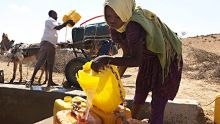While US President Donald Trump and Chinese President Xi Jinping were midway through their meal of pan-seared Dover sole with champagne sauce on Thursday evening, a US naval destroyer was launching the first of 59 Tomahawk cruise missiles, lighting up the sky in eastern Syria. It had been just 63 hours since the Syrian government's horrific chemical attack on civilians.
Earlier that day, the US President had been shaken by shocking photos from the nerve agent strike – far more graphic than those the public had seen.
More World News Videos
Syrian aircraft destroyed after US strikes
Senior US military officials say the missile strikes launched early Friday struck the Shayrat air base near Homs, Syria, destroying up to 20 aircraft.
According to senior administration officials and members of Congress who spoke with Trump, the President had been especially struck by two images: Young, listless children being splashed with water in a frantic attempt to cleanse them of the nerve agent; and an anguished father holding his twin babies, swathed in soft white fabric, poisoned to death.
"What the world saw last night was the United States Commander-in-Chief, and also a father and grandfather," said Kellyanne Conway, counsellor to the president, on Friday. "The world recoiled in horror at babies writhing and struggling to live. And who could avert their gaze – and that includes our very tough, very resolute, very decisive President."
Over an intensive 2½ days, the President's national security team convened several high-level meetings with representatives from the Pentagon, the State Department, intelligence agencies and the National Security Council. "I don't think it was an emotional reaction at all," said US Secretary of State Rex Tillerson, who was involved in the discussions. "President Trump evaluated the facts, that the attacks occurred on his watch, and [as he] reflected upon prior responses or lack of responses, he came to the conclusion that we cannot yet again turn away, turn a blind eye from what's happened."
It all began during the early hours of Tuesday with bombs falling on the town of Khan Sheikhoun, in the rebel-held territory of Idlib Province. Video footage of the attack quickly surfaced, showing women and children gasping for breath and foaming at the mouth as they fought the effects of what officials later said was sarin gas, a brutal nerve agent. Behind closed doors, the US President was already eyeing a response:
Tuesday: 10.30am: Trump huddles at the White House with his military and national security advisers for what his aides now describe as an extensive briefing on the attack. The President had questions. "He was very interested in understanding better the circumstances of the attack and who was responsible," said national security adviser, Lieutenant-General Herbert R. McMaster.
Wednesday: Midday: Trump makes his first public comment about the carnage in Syria, telling a group of reporters the attacks are unspeakable. As his advisers continue working on details for a military strike, Trump remains uncharacteristically disciplined about any plans. Asked by a reporter whether he intends to take any action with regard to Syria, Trump says, "You will see."

Wednesday: 1.15pm: At a news conference in the White House Rose Garden, Trump says his horror at the images of "innocent children, innocent babies" choked by poison gas has led him to reassess his approach to Syria. "It's very, very possible, and I will tell you it has already happened, that my attitude towards Syria and Assad has changed very much," he said, adding "It crossed a lot of lines for me."
Wednesday 3pm: Trump convenes a meeting of his National Security Council. Over several hours, the President's top military and national security aides present him with three options for action in Syria, which he narrows down to two. Aides reveal Trump was looking for something aggressive but "proportionate" that would be sufficient to send a signal.

Thursday: 9am: As the President participates in an event honouring wounded veterans, he mulls his options. He tells the veterans they are "real heroes" who have sacrificed for their country. "I call them America's winners because they're winners," said Trump.
Thursday: 4pm: Trump lands at his private Mar-a-Lago estate in Florida and is whisked to another meeting with the National Security Council where military options are now homed in on a Tomahawk cruise missile strike at Al Shayrat airfield which, they say, was used to launch the Syrian government warplanes that dropped the chemical weapons.

Thursday 6.30pm: After posing for pictures, Trump sits down for formal dinner with Xi, who arrived in Florida earlier that day. An hour later, from a phone line in a small, nondescript room at the United States Al Udeid Air Base in Qatar, American commanders begin warning their Russian counterparts of an imminent strike. That warning comes no more than 90 minutes before the strike, according to one American official. In other words, it is a notification rather than consultation. The conversation is described as lengthy with the Russians doing much of the talking.
Thursday: 7.40pm: At 2:40am local time in Syria, two destroyers, the USS Porter and the USS Ross – already in position in the eastern Mediterranean – fire 59 Tomahawk missiles towards the airfield, targeting aircraft, shelters, radars, an air defence system, ammunition bunkers and fuel storage sites. Meanwhile, as dinner wraps up in Florida and with the missiles about to hit their targets, Trump pulls Xi away from other guests and informs him of the strike. Aides describe it as a brief, matter-of-fact discussion.

Thursday: 9.43pm: Trump again assembles his national security team and other top advisers for a meeting, a photograph of which is distributed the following day. Thirty minutes later, reporters are called in for a statement that Trump delivers to announce the strikes. It is organised so swiftly that media are unable to broadcast it live. The rush also means sound quality is poor though the importance of his words are clear.
"We ask for God's wisdom as we face the challenge of our very troubled world," said Trump who added: "We hope as long as America stands for justice, then peace and harmony will in the end prevail."
Washington Post, New York Times

















0 comments
New User? Sign up